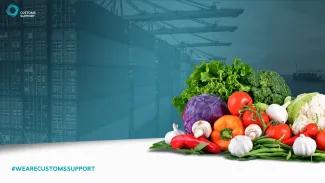What are the challenges of international fresh food supply?
Health is the number one priority when it comes to fresh food. We, as consumers, need to know that the food we buy isn’t going to make us unwell. Any problems that arise also need to be traceable so that potential epidemics can be locked down.
One of the main ways that food stays fresh is with temperature control, but time is also a factor. Food safety authorities cannot wait too long to assess a food shipment as it loses freshness the longer it stays at the border or inspection point – especially if they open a refrigerated unit for a physical check.
For this reason, preparation is key when moving fresh food internationally. You need to be ahead of documentation and reporting requirements to minimise delays.
Which documents are required for fresh food?
As it is with most industries, the legislation for fresh food depends on the classification and origin of your goods.
There are a few assumptions that you can make, such as the need for a veterinary certificate for animal products and a phytosanitary certificate for plants, but these are not hard and fast rules.
It is best to check with your supplier before you ship the goods to ascertain what you need. The supplier will liaise with their local authorities, so they make sure the appropriate documentation is issued. You don’t want to find out during importation that you are missing a document or information as this can take days to rectify and additional costs incurred.
What are some problems that can arise with fresh food and customs authorities?
Speed is key during import release as you ideally want to collect the goods from the port within a day or so from landing. When you can’t do this, it can be an expensive problem.
Ensuring that documentation has been signed off correctly, all the details match across the paperwork, and that your customs partner has all the necessary documentation and information on time is a priority when clearing fresh food through the border. It helps us to get your clearances processed on time.
How can Customs Support help you to remain quick and compliant?
Working in 13 countries across the EU and UK, our customs declarants are used to handling fresh food imports and exports across Europe.
Their expertise is backed by customs consultants dedicated to staying ahead of trends in all things customs, meaning that we help you prepare for changes before they happen.
For example, we are working closely with authorities and traders in the UK on the upcoming changes to importing plant products, animals or animal products with the Target Border Operating Model. Our colleagues across Europe are helping exporters who trade with Britain to prepare from their side.
One of the key things we do for EU-UK traffic is our end-to-end customs clearance service, which allows us to process your import and export customs declarations simultaneously. No need to manually re-enter data, reducing your risk and speeding up the process at the same time.
What would be the first step you’d take if you needed help with fresh food and customs?
I’d speak to one of our team in the country that you are importing to or exporting from. They’ll be able to connect you to a consultant for a customs quick scan, and then link you to the right operational team for what you need.















